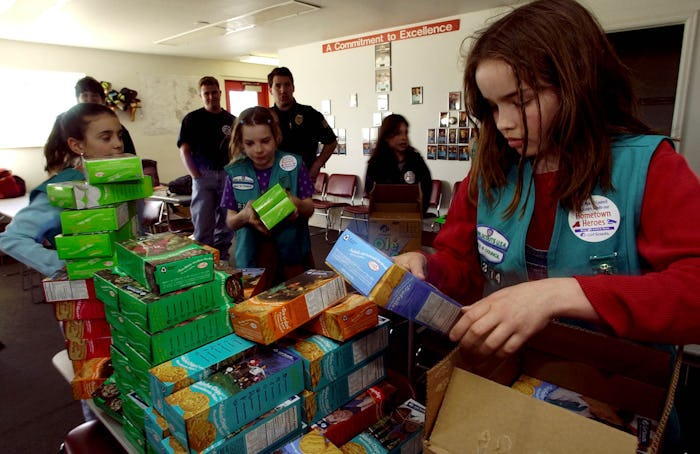Life

Why Selling Girl Scout Cookies Is About So Much More Than A Sugar Rush
Stocking up on Thin Mints or Tagalongs from your favorite troop could help kids build some serious character. In fact, selling Girl Scout Cookies is about so much more than a sugar rush. The lessons about navigating competition, participating in tradition, and braving the sales world last way longer than any box of Trefoils. (Which is not long at all in my house, at least.)
First, there's the whole element of competition in cookie selling, which affects each kid differently. "For children who like to compete and win, this can be a very rewarding experience in that they experience each sale as a 'win' that can create a natural high or rush of endorphins," clinical psychologist Dr. Liz Matheis tells Romper. The competition is its own motivation. "For others, this is a task that they know will benefit the group at large, so that becomes the motivation and driving force." The competition can also reinforce camaraderie among each troop. "If we compete as a team, it bonds us in strong ways," sociologist Laura Martocci, Ph.D. tells Romper.
But this competition can also turn up the pressure. Kids who are having trouble selling enough cookies may feel like they aren't as involved in the team, so it's important for group leaders to frame this as a learning experience. "Thus, selling more cookies, selling more next year, [or] devising some other function which will bring financial support to the group, are as integral to a positive outcome for those who are not top sellers, but their performance does not stigmatize them or threaten the identity of the group," says Dr. Martocci. There's a lot of group dynamics at play here for troop members.
Furthermore, participating in the long-standing tradition of selling Girl Scout cookies can give kids a sense of belonging. "It is a proud tradition, identified with, and integral to, the group. More than this, it is a tradition full of stories — about quirky experiences (that elicit group-bonding laughter), unexpected large orders, nutrition, even a troop’s identity in relation to other troops," says Dr. Martocci. Sharing stories and common experiences with others in a group is a key way to bond, and it promotes a much-needed sense of belonging. "Belonging, or as some psychologists call it, 'belongingness needs,' are crucial to our health and happiness," says Dr. Martocci. "The need to belong is hard-wired into our brain, and probably arose in our evolution pre-history, when exclusion from the tribe, which protected against external elements and threats, literally threatened the physical well-being of the individual," he explains. Bonding with others in the troop to meet the shared goal of selling more Samoas may also help meet some serious social needs in your kid.
Even dealing with the inevitable bumps along the way can help build your kid's confidence and skill set. "With redirection (e.g., making something and leaving the selling to others), confidence can be restored," Paul Turke M.D., a board-certified pediatrician who writes the "Bringing Up Baby" blog for Psychology Today, tells Romper. These lessons in perseverance are pretty critical, too.
Lastly, it's difficult to overstate the social skills that these cookie sales can help develop. "For many of our kids who are used to interacting via email and texting, walking up to a door and having to speak to another human being can be intimidating," says Dr. Matheis. "My daughter is a Girl Scout and she often shares that she feels embarrassed and doesn't know what to say. So, we create a script and practice it." Kids who are already extroverted will welcome the chance to practice those social skills and support their troop, as Dr. Matheis further explains. It's a safe way to work on the people skills that will serve these kids for the rest of their lives.
So go ahead and stock up on your favorite cookie when your local troop comes calling. (Remember, it's totally OK to freeze Girl Scout Cookies for later use, according to Little Brownie Bakers.) Selling Girl Scout Cookies can open up a whole world of opportunity for these kids.
Experts:
Dr. Liz Matheis, licensed clinical psychologist and certified school psychologist, Psychological and Educational Consulting
Laura Martocci, Ph.D., sociologist, a former Associate Dean and faculty member in the Department of Sociology at Wagner College, author of Bullying: The Social Destruction of Self and My Bullied Past—Why does it still HURT?
Paul Turke, board-certified pediatrician who writes the "Bringing Up Baby" blog for Psychology Today
This article was originally published on